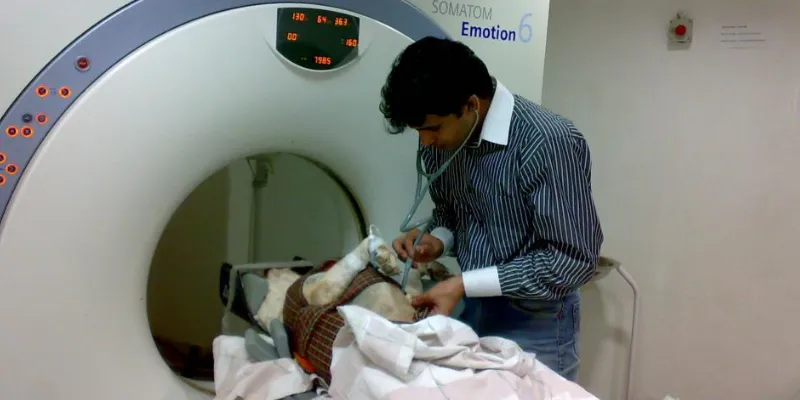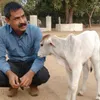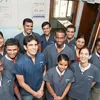Veterinary surgeon and motivational speaker Pawan Kumar shares his journey of struggle, determination, grit, and perseverance
Dr Pawan Kumar, veterinary surgeon and Chief Medical Officer, Cessna Lifeline Veterinary Care Clinic, talks to YourStory about starting up early in the veterinary space and what led to his success.
One of the top veterinary surgeons in the country, Dr Pawan Kumar started Cessna Lifeline Veterinary Care Clinic, a multispecialty animal hospital in Bengaluru, in 2005.
Over the years, his dedication to the field of veterinary practice and healthcare has garnered him a lot of respect. However, there is much more to him than what meets the eye.
Dr Pawan’s journey is an example of what it means to never give up, and to follow your dreams. From being born in a small village in Haryana with limited opportunity, to establishing himself with three veterinary clinics in the country, his struggle, determination, grit, and perseverance is something we can all seek inspiration from.
Watch him in conversation with YourStory Founder and CEO Shradha Sharma in this video below:
In a conversation with YourStory, Dr Pawan Kumar, talks about his inspiration and struggles in the early days, his advice to the youth about choosing a career, and his advice for fellow veterinary doctors.
Edited excerpts from the interview:
YourStory: Did you ever think that one day you would be an entrepreneur? Do you call yourself an entrepreneur today?
Pawan Kumar: When I started my practice, we started as a small clinic in Indiranagar, Bengaluru. There was a zeal and burning desire inside to build something.
At that time, I felt the veterinary industry had to grow to a different level in India. There was a need to create a coherent team, and there was also a need to put in serious effort for steady changes to take place. This was something I was always pushing for with my personal team.
My team has been extremely helpful and supportive in this regard, and over the years, I have noticed a positive change with my clients and the pets as well. Being the motivating force behind our success, our clients have encouraged us to do a lot of things, and made the impossible possible for us.

First clinic in Indiranagar
Today, we have three clinics - two in Bengaluru and one in Gurugram, and probably will have many more in the future.
I never thought of being an entrepreneur, but all I know is that we had a desire, and this is what it has grown into today.
YS: What was it like growing up in Haryana? Were you always surrounded by animals? Did you own a pet?
PK: Growing up in Haryana, I didn’t have a pet of my own, but we had many animals in the vicinity. I used to mostly come across cows, buffaloes, donkeys, and camels. There used to be dogs and cats, but they were mainly community dogs. My family would usually allow the dogs to come home and eat and seek shelter. But it was never a pet dog.
My father was also in the veterinary field working as an assistant, and so we were always associated with animals. Today, this has made a huge impact in my life and my thought process.
I was also born in a veterinary hospital, in Hisar, Haryana.

Dr. Pawan Kumar carrying out MRI on pet bulldog
YS: What was your family’s reaction when you started your practice? Were they supportive of your decision to start your own hospital?
PK: I was initially working in a government job in Haryana at the National Brain Research Centre (NBRC). At that time, everyone was behind a government job in Haryana.
Resigning from this job and coming to Bengaluru to join an organisation with half the salary was quite difficult for me. My family was also quite apprehensive about this. However, I told them that I wanted to work in the clinical sector and develop something new.
Looking back, I realise my dreams were not very clear at that time. However, I knew that working in the clinical area was something I wanted to do. I was determined to travel overseas and get a better job, but when that didn’t happen, and I came back to Bengaluru. I took the junior research fellowship exam and was the second class topper. It was then I decided to do my master’s in surgery and radiology. Initially, I joined an animal welfare organisation for a couple of years, and following this I started my own clinic. I was determined to make it successful.
YS: In your recent TEDx talk, you said that you are a strong believer that “youth should choose their career judiciously”. Can you elaborate on this?

Dr. Pawan Kumar at TEDx Vydehi School
PK: I think it is not only for youth, but this applies to anyone wanting to work anywhere. My TEDx talk came from the idea that there are two ways of thinking in life:
a) You are working for the money, and you want to earn your bread and butter.
b) There is something that goes beyond bread and butter, where you want to make yourself feel fulfilled and happy.
I come across many kids these days saying, “I will do my MBA or become a top lawyer because it will bring me money, or I will join a government job, become an IAS officer so that way my future is secured, and I will have some status in society.”
I feel people think from an angle, which is not an inner angle but one that is superficial, and doesn’t last for a long time. Hence, I believe that when it comes to deciding a career for yourself, choose it ‘judiciously’ because you are going to be in this for a lifetime, and it will definitely be an integral part of your life.
I would say, pick something that makes you happy and internally satisfied at the end of the day. So choose something in which you enjoy that sense of repetition.
YS: What is your advice to aspiring veterinarians?
PK: I believe in one simple thing, which is everyone has one life and you can’t do everything. So do what you like to do, and do something where you feel you can put your heart, soul, and entire energy into. Be determined, plan it seriously, and make your life worth living.
The only thing I can probably tell everyone is that you have one life, so live it in the best way you know how to.
The second thing is - everyone has a purpose. You might realise this purpose at the age of 10, 20, 50, or even 70, but when you do realise it, realise it.
Whatever your definition of success might be, you should keep striving to make it successful. Be determined in the process in what it is that you want for yourself. I think any aspiring individual needs to know this. I believe in this strongly, and everyone should definitely look into this.
YS: Your advice to those who want to start their own veterinary hospital?
PK: They should definitely install a proper software system, which enables them to control their clinic and practise in a better manner. They should establish standard operating procedures (SOP's) from the beginning so that it will benefit them in the long run.
Veterinarians should also focus on specialisation and choose an area where they can become a specialist, so that they can bring a change. This will automatically become word of mouth, and people will start consulting them for specific problems and cases with their pets. They should also build a network of fellow surgeons and clinical experts whom they can consult on difficult cases.
YS: Why the name Cessna?
PK: Cessna is the name of a US-based aircraft, but it is also the name of a crossbreed dog.
There was a lady, an animal activist and volunteer, whom I met after leaving my government job, and who inspired me. She used to look after many stray dogs and she adopted a dog named Cessna. It was an extremely kind and understanding dog, and the first dog on which I carried out a peritoneal dialysis. So, I named the clinic after the dog, and we have dedicated everything to her.
YS: Now that you have three clinics, do you see yourself expanding? What are your future plans?
PK: Right now, we are working on the SOPs and training the veterinary staff. We already have three clinics, and we are coming up with a pet resort in the Hosur area. We have bought the land there, and we hope to encourage pet boarding, swimming, and hydrotherapy at this resort.
Apart from this, we are planning to open another clinic in Bengaluru, and we are in talks for one in Mumbai. I would like to have a clinic in the city of Kolkata and one more in Delhi. We haven’t decided in terms of numbers, but as we grow the team, we would definitely like to have more clinics.
(Edited by Megha Reddy)









